BRAD MEHLDAU / “River Man”
“River Man” is a singularly strange song. It’s about death, about a girl’s desire to die, but somehow it remains hopeful and optimistic. “River Man” is also an onomatopoeia song, meaning, it literally sounds like what it’s about. In the original version, the opening notes are played by acoustic guitar and it sounds almost like a lullaby, but as if the river man is trying to lull you to death instead of to sleep.
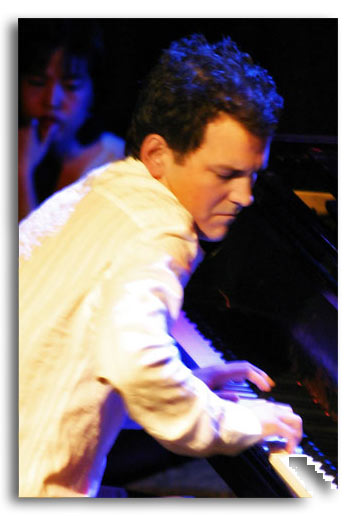 Then listen to the beginning of Brad Mehldau’s version (from The Art of The Trio, vol. 3). Mehldau plays the intro with just his left hand, way down in the bass notes, recreating the ebb and flow of drifting water.
Then listen to the beginning of Brad Mehldau’s version (from The Art of The Trio, vol. 3). Mehldau plays the intro with just his left hand, way down in the bass notes, recreating the ebb and flow of drifting water.
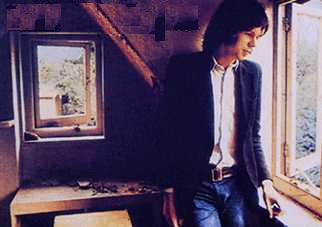 The tune was written and originally performed by a young British singer-songwriter named Nick Drake. (“River Man” first appeared on Drake’s 1969 album Five Leaves Left.) As you might imagine given the morbidity of his subject matter, Drake suffered from severe depression and eventually killed himself by overdosing on anti-depressants. (Whether the overdose was intentional or accidental is still debated.) Drake left behind three album’s worth of material, all of which was virtually ignored during his brief life. In recent years though, his spare, evocative music has become increasingly popular. “River Man” in particular seems to be becoming almost a standard in some jazz circles.
How a folk-rock song about death came to be attractive to jazz musicians is one of those great mysteries of music. I don’t know enough about music theory to agree or disagree, but I’ve heard it said that “River Man” may sound simple – as I said, like a lullaby - but that the simplicity is deceptive. In actuality, it has an unusual time signature (5/4) and, because of Drake’s idiosyncratic tuning of his guitar strings, an equally unusual chord progression. For musicians wishing to remake “River Man,” Drake’s odd choices make for a challenge, and, as we all know, jazz musicians love challenges.
The tune was written and originally performed by a young British singer-songwriter named Nick Drake. (“River Man” first appeared on Drake’s 1969 album Five Leaves Left.) As you might imagine given the morbidity of his subject matter, Drake suffered from severe depression and eventually killed himself by overdosing on anti-depressants. (Whether the overdose was intentional or accidental is still debated.) Drake left behind three album’s worth of material, all of which was virtually ignored during his brief life. In recent years though, his spare, evocative music has become increasingly popular. “River Man” in particular seems to be becoming almost a standard in some jazz circles.
How a folk-rock song about death came to be attractive to jazz musicians is one of those great mysteries of music. I don’t know enough about music theory to agree or disagree, but I’ve heard it said that “River Man” may sound simple – as I said, like a lullaby - but that the simplicity is deceptive. In actuality, it has an unusual time signature (5/4) and, because of Drake’s idiosyncratic tuning of his guitar strings, an equally unusual chord progression. For musicians wishing to remake “River Man,” Drake’s odd choices make for a challenge, and, as we all know, jazz musicians love challenges.
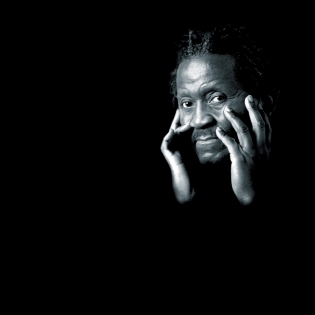 Jazz veteran Andy Bey recently (well…relatively recently) recorded a spectacular version of “River Man” for his 1998 ‘comeback’ album Shades Of Bey. Bey’s version is very true to the original, duplicating the acoustic intro, the strings and that sweet, swaying feel…everything, I suppose, except the desperation. But while Drake sang with a sort of flat detachment, Bey’s warm baritone caresses the lyrics. Drake made suicide sound painless. Bey makes it sound beautiful. I’m not sure which is more disturbing.
Jazz veteran Andy Bey recently (well…relatively recently) recorded a spectacular version of “River Man” for his 1998 ‘comeback’ album Shades Of Bey. Bey’s version is very true to the original, duplicating the acoustic intro, the strings and that sweet, swaying feel…everything, I suppose, except the desperation. But while Drake sang with a sort of flat detachment, Bey’s warm baritone caresses the lyrics. Drake made suicide sound painless. Bey makes it sound beautiful. I’m not sure which is more disturbing.
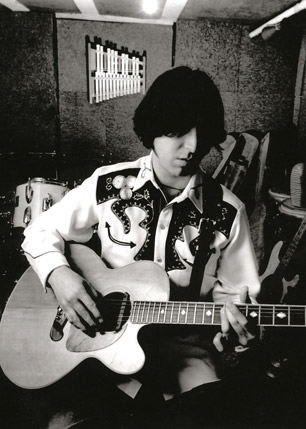 Shawn Lee – a prolific producer, beat-meister and multi-instrumentalist – recorded a thoroughly anachronistic version of “River Man” a couple of years ago. (Available on Ubiquity Records’ collection of covers called Rewind! Vol. 4.) After listening to the folk and jazz versions of “River Man,” it can be both jarring and relieving to hear Shawn’s modern funk/rock vibe. Shawn treats the words as words: his version isn’t about death or rivers. It’s like one of those pieces of modern art that make no sense unless you know the context the artist had in mind when they created it. Or maybe Shawn is singing about the same thing everybody else is singing about, but he wanted to set up a contrast between the music and lyrics. It’s hard to listen to Shawn’s version and actually pay attention to the words, but when you do, it definitely makes you think twice.
Speaking of the words, my favorite line from Drake’s song is the last one, where the river man observes coolly, “Oh, how they come and go.” Brad Mehldau’s version is all-instrumental but if you listen carefully to the end of his piece, you’ll hear that Mehldau plays the ‘how they come and go’ part too. Of all the versions of “River Man” I’ve heard – jazz or otherwise - Mehldau’s remains my favorite, probably due at least in part to its also being the first version I heard. I think of Drake’s original as taking place on a crisp autumn day. Bey’s is a little earlier in the year – maybe mid-summer. Mehldau’s is definitely wintertime. I imagine walking along a path in the woods, all bundled up in jacket, hat and gloves, and coming across a scene of a lone girl in a sundress, sitting right beside the half-frozen river.
—Mtume ya Salaam
River’s invitation
See, Mtume when you do this kind of stuff I just lay back and go with the flow. Of course, I know the Andy Bey version. Didn’t know you knew it but am not surprised that you do. I’ve never listen to any of the other versions before.
You’re right about this song being attractive to jazz musicians and you are also probably right that in “River Man” there’s much more to work with than simply a cute melody. Shawn Lee seems to me to violate the spirit of the song. There is no reflection in Lee’s version, just a relentless thumping, like punching someone in the face or fighting someone to hold their head under water. Yeah, I guess what I mean is that Shawn’s thing sounds more like a murder than a suicide.
Brad Mehldau is good. I wish he had gone a bit longer and dug a bit deeper into the song.
Andy Bey sounds like a movie soundtrack, that meditative moment in the gloaming when the anti-hero, the tragic figure, responding to the death of his lady, walks alone to the middle of the bridge, stops, takes a short smoke and then slowly lifts himself over the rail and gracefully falls….
The strange thing is, suicide didn’t much use to be our thing but it’s happening more and more among Black men. There’s also that opening of James Baldwin’s novel Another Country where Rufus jumps off a bridge in New York City. And the other suicide reference bumping around is from a short poem by Langston Hughes that said something like: "the calm, cool face of the river asked me for a kiss."
My mind movie whose theme is the deterioration of social networks ends when the placid face of the river resumes its slow flow after the momentary disruption of the falling body roughly entering the water with a loud splash (that no one hears). We see maybe a hat float slowly away. The sun is setting. The end.
Mtume, what made you choose this song about suicide? I never figured it out before that suicide was the theme. I just liked the feel of it. The melancholy. Something like the blues. Which, of course, is a mood that runs all up, back, around and thru our music. The blues. Not the extreme of suicide but certainly an embracing of the kind of sadness that is but two steps from suicide.
—Kalamu ya Salaam
More on Drake and Mehldau
I chose the song by accident. I was running one day with my iPod on random and Andy Bey's version came on. I hadn't heard it before. (I download songs from all over the place and dump them in a 'Listen To This' folder to see if I like them or not.) As soon as Andy started singing, I thought, "Hey! That's the Brad Mehldau song I like." I didn't catch all the lyrics the first time, but one line Andy sang grabbed me. It was something about the sky blowing away. I already liked the melody from hearing Brad play it and I like lyrics like those - lyrics that sort of say what they mean and sort of don't - so I told myself when I got home I was going to find out more about the song. Who wrote it? How old was it? What did it originally sound like? Who else had performed it? Etc. At that point, the only things I knew about Nick Drake were things I'd heard from back in my Tower Records days: that he'd killed himself when he was still a young man and that his records didn't sell much (which isn't accurate anymore). Then again, I didn't know it was a Nick Drake song anyway. I only found that out later.
Shawn Lee – a prolific producer, beat-meister and multi-instrumentalist – recorded a thoroughly anachronistic version of “River Man” a couple of years ago. (Available on Ubiquity Records’ collection of covers called Rewind! Vol. 4.) After listening to the folk and jazz versions of “River Man,” it can be both jarring and relieving to hear Shawn’s modern funk/rock vibe. Shawn treats the words as words: his version isn’t about death or rivers. It’s like one of those pieces of modern art that make no sense unless you know the context the artist had in mind when they created it. Or maybe Shawn is singing about the same thing everybody else is singing about, but he wanted to set up a contrast between the music and lyrics. It’s hard to listen to Shawn’s version and actually pay attention to the words, but when you do, it definitely makes you think twice.
Speaking of the words, my favorite line from Drake’s song is the last one, where the river man observes coolly, “Oh, how they come and go.” Brad Mehldau’s version is all-instrumental but if you listen carefully to the end of his piece, you’ll hear that Mehldau plays the ‘how they come and go’ part too. Of all the versions of “River Man” I’ve heard – jazz or otherwise - Mehldau’s remains my favorite, probably due at least in part to its also being the first version I heard. I think of Drake’s original as taking place on a crisp autumn day. Bey’s is a little earlier in the year – maybe mid-summer. Mehldau’s is definitely wintertime. I imagine walking along a path in the woods, all bundled up in jacket, hat and gloves, and coming across a scene of a lone girl in a sundress, sitting right beside the half-frozen river.
—Mtume ya Salaam
River’s invitation
See, Mtume when you do this kind of stuff I just lay back and go with the flow. Of course, I know the Andy Bey version. Didn’t know you knew it but am not surprised that you do. I’ve never listen to any of the other versions before.
You’re right about this song being attractive to jazz musicians and you are also probably right that in “River Man” there’s much more to work with than simply a cute melody. Shawn Lee seems to me to violate the spirit of the song. There is no reflection in Lee’s version, just a relentless thumping, like punching someone in the face or fighting someone to hold their head under water. Yeah, I guess what I mean is that Shawn’s thing sounds more like a murder than a suicide.
Brad Mehldau is good. I wish he had gone a bit longer and dug a bit deeper into the song.
Andy Bey sounds like a movie soundtrack, that meditative moment in the gloaming when the anti-hero, the tragic figure, responding to the death of his lady, walks alone to the middle of the bridge, stops, takes a short smoke and then slowly lifts himself over the rail and gracefully falls….
The strange thing is, suicide didn’t much use to be our thing but it’s happening more and more among Black men. There’s also that opening of James Baldwin’s novel Another Country where Rufus jumps off a bridge in New York City. And the other suicide reference bumping around is from a short poem by Langston Hughes that said something like: "the calm, cool face of the river asked me for a kiss."
My mind movie whose theme is the deterioration of social networks ends when the placid face of the river resumes its slow flow after the momentary disruption of the falling body roughly entering the water with a loud splash (that no one hears). We see maybe a hat float slowly away. The sun is setting. The end.
Mtume, what made you choose this song about suicide? I never figured it out before that suicide was the theme. I just liked the feel of it. The melancholy. Something like the blues. Which, of course, is a mood that runs all up, back, around and thru our music. The blues. Not the extreme of suicide but certainly an embracing of the kind of sadness that is but two steps from suicide.
—Kalamu ya Salaam
More on Drake and Mehldau
I chose the song by accident. I was running one day with my iPod on random and Andy Bey's version came on. I hadn't heard it before. (I download songs from all over the place and dump them in a 'Listen To This' folder to see if I like them or not.) As soon as Andy started singing, I thought, "Hey! That's the Brad Mehldau song I like." I didn't catch all the lyrics the first time, but one line Andy sang grabbed me. It was something about the sky blowing away. I already liked the melody from hearing Brad play it and I like lyrics like those - lyrics that sort of say what they mean and sort of don't - so I told myself when I got home I was going to find out more about the song. Who wrote it? How old was it? What did it originally sound like? Who else had performed it? Etc. At that point, the only things I knew about Nick Drake were things I'd heard from back in my Tower Records days: that he'd killed himself when he was still a young man and that his records didn't sell much (which isn't accurate anymore). Then again, I didn't know it was a Nick Drake song anyway. I only found that out later.
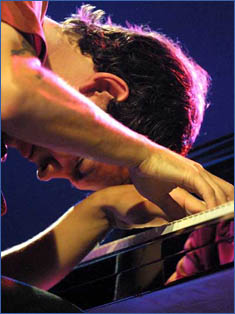 You said you wished Brad Mehldau had gone deeper. Actually, he has. "River Man" has become sort of an emotional centerpiece of Brad Mehldau's concerts. (His words, not mine.) To my knowledge, Mehldau recorded it three times. There's the short version with a trio, a much longer version with a trio and a longish solo piano version. The solo version is from Mehldau's Live In Tokyo album and the long trio version is from Mehldau's 2CD live set Progression. I've never heard the solo version, but I'll include the long trio version in the jukebox. The long trio version is very good. During his seven or eight-minute solo, Mehldau illustrates his habit of playing different melodies with each hand - sometimes it sounds like their must be two pianists on stage. The short version remains my favorite though because Mehldau maintains the melancholic, bluesy feel throughout. In the longer version, the improvisation changes the mood. It's a great version in its own right, but I forget what song I'm listening to.
Another thing I want to mention. In my write-up, I said that although "River Man" is about death, it remains strangely hopeful. I've been thinking about the lyrics more since then, and I don't think the song is about death after all. I think it's about someone contemplating death. A subtle but significant difference. Plus, that vibe of hopefulness isn't just a vibe; it's there in the lyrics too:
You said you wished Brad Mehldau had gone deeper. Actually, he has. "River Man" has become sort of an emotional centerpiece of Brad Mehldau's concerts. (His words, not mine.) To my knowledge, Mehldau recorded it three times. There's the short version with a trio, a much longer version with a trio and a longish solo piano version. The solo version is from Mehldau's Live In Tokyo album and the long trio version is from Mehldau's 2CD live set Progression. I've never heard the solo version, but I'll include the long trio version in the jukebox. The long trio version is very good. During his seven or eight-minute solo, Mehldau illustrates his habit of playing different melodies with each hand - sometimes it sounds like their must be two pianists on stage. The short version remains my favorite though because Mehldau maintains the melancholic, bluesy feel throughout. In the longer version, the improvisation changes the mood. It's a great version in its own right, but I forget what song I'm listening to.
Another thing I want to mention. In my write-up, I said that although "River Man" is about death, it remains strangely hopeful. I've been thinking about the lyrics more since then, and I don't think the song is about death after all. I think it's about someone contemplating death. A subtle but significant difference. Plus, that vibe of hopefulness isn't just a vibe; it's there in the lyrics too:
Betty said she prayed today For the sky to blow away Or maybe stay She wasn't sureThat's the lyric that first caught me: "Betty said she prayed today / For the sky to blow away." Obviously, that part is a wish for death. If the sky blows away, there's nothing. "Or maybe stay," Drake continues. "She wasn't sure." So there's a bit of indecision. I wouldn't exactly call that optimism though. But then he says:
For when she thought of summer rain Calling for her mind again She lost the pain And stayed for moreElsewhere in the song, Drake talks about falling leaves. From that we can assume it must be autumn time. Of course, we can also see the line metaphorically, as when we say a person is in the "springtime of their youth." If someone is in their "autumn time," then they're near the end. But, in the same moment that Betty prays for the sky to blow away, she also thinks of "summer rain calling for her mind again." If we think of both summer and rain as signifying life or growth, it stands to reason that "she lost the pain." So there's the optimism. I have to admit though, "and stayed for more" isn't a particularly upbeat end to that stanza. My immediate thought is, "and stayed for more" of what? Probably pain. So there's a mix there. Pain and hope. Depression and optimism. One last thing and I'll wrap this up. I came across an NPR interview with Brad Mehldau himself where he talks about "River Man." It's a very interesting conversation, particularly because Mehldau says he doesn't know what the song is actually about. He says he just likes "the feel" of it. I like that Mehldau can get the mood and feel exactly right without actually being able to verbalize the meaning of the lyrics. There's also a thought-provoking bit about Drake's phrasing. Mehldau compares Drake's phrasing to jazz singers like Billie Holiday, explaining that Drake sings behind the beat. He then plays the melody from "River Man" both behind the beat (as Drake sings it) and right on the beat (as a conventional singer would) so we can hear the difference. It's a more striking difference than you might imagine. Mehldau also talks about the 5/4 time signature of "River Man." (And again, he actually counts out the beat as he plays the melody. It's great to hear all of these musical concepts instead of just talking about them.) Baba, you'll like this: Mehldau compares "River Man" to Coltrane's version of "My Favorite Things"—something I never would've come up with myself, but when Mehldau plays the tunes back-to-back, I'll be damned if they don't have the same bluesy yet lilting quality. Perhaps this has something to do with "My Favorite Things" being in 3/4 time. If you listen to mostly popular music (gospel, soul, rap, rock, electronica...whatever), then something like 99% of what you hear will be in 4/4 time. It seems to me that anything not in 4/4 automatically sounds a little...off. —Mtume ya Salaam Aaaaahhhh, the Breath of Life. Yeaaaahhhh! This is what I'm talking about. This kind of back and forth, this investigation and speculation, this exchanging and conversating. We didn't talk much about this "River Man" track when you came up with the idea of posting it. When I read your write-up and responded, I didn't know about the Mehldau quote nor the long version. And of course I had not done a close reading of the lyrics. Nor for that matter, had I heard the Theo Parrish selections, and I was still deciding on which Odetta tracks to use. And now here it is about three hours before we post onto the website and it's thrilling. It's like being at a great performance of the music. You learn a lot about other things and in the process you learn some more about yourself. Who you are, what you like and dislike, and (more importantly) why or how come you like it. (As in "OK, that's where that came from" or, "Oh, that's why I was digging that." Of course, I am talking about the Coltrane connection.) This shit is crucial. The three thing, introducing the three feel into a four world, whether it was the 3/4 that is popular in gospel or the 6/8 from Latin rhythms (particularly Afro-Cuban) was a major development in the music. Trane wasn't the first to do that. Indeed, Max Roach was in to it long before Trane, but I think Trane found a way to hook up popular melodies - a blues-based sound with a "three" rhythm - using ideas he got from Miles on modal development of the harmonic basic for improvisation. If you want to really get your mind blown, get Ray Charles At Newport and listen to "Blues Waltz," a Max Roach composition on which Ray Charles plays alto! That was recorded July 5, 1958. John Coltrane recorded "My Favorite Things" on October 21, 1960. What I love about doing BoL is that you can't tell in advance when something surprisingly beautiful is going to drop. Once I started preparing the Odetta tracks and write-up, memories swept over me, over 40 years of consciously digging into the music hit me. It almost makes a man cry. And, Mtume, you digging Theo Parrish sent me into some of DJ Spinna's more obscure stuff. (I usually listen to and enjoy Spinna covering/remixing other artists but Spinna has a whole catalogue of original material.) And then, there's this discussion of "River Man." But the intellectual stuff is not the ultimate deeptitude. When you listen to the jukebox and factor in reflecting on your life, goddamn. It's like you been watching this movie and enjoying it, somewhat, laughing a little, and then POW, you realize it's your life story, just without you as the starring character. But it's you. Really all the stuff you deal with. The music. It's us. All the stuff we deal with. And that's what BoL is talking about. —Kalamu ya Salaam
This entry was posted on Sunday, March 25th, 2007 at 12:34 am and is filed under Cover. You can follow any responses to this entry through the RSS 2.0 feed. You can leave a response, or trackback from your own site.
3 Responses to “BRAD MEHLDAU / “River Man””
March 25th, 2007 at 7:49 am
One valuable thing about Breath of Life is the breadth of life experiences wrapped up in songs featured here. The gladness of new birth; madness and blue mirth; the sadness of leaving Earth – it’s all here… encoded translations of the human condition expressed through words and sounds that extend our ability to grasp it.
Such is the case with “River Man,” a song that didn’t impress me as meaningful when I first heard Andy Bey’s rendition of it. Shoulda known better. After all, Andy is known for his deep, contemplative selections. What did impress me was the rhyming poetry in each stanza (ignoring what was actually being said). Untrained ears don’t always pick up on what’s important.
Now that you’ve brought it to this space, I made myself listen and am left to ponder the hauntingly evocative Nick Drake original. Here in New Orleans, in the dispiriting aftermath of Hurricane Katrina, “River Man” suddenly seems poignant and pressing.
There is, as Gamble and Huff taught, a message in the music. Thanks for delivering the word.
March 25th, 2007 at 10:05 am
How ironic, a site about black music educating me (an English white/mid-eastern kid) about white English music. Last week with Alice Russell and here with Nick Drake.
I’ve heard some of my friends (white just for the record) who aren’t as into black music as I am, going on about Nick Drake before but i’ve never really been too interested to get into him.
It’s odd, I suppose I operate a slightly racist music policy in that i’m always digging up black music and tend to sideline white musicians. I guess I tend to favour music that espouses similar values to the black styles i’m into. Thing is though, with someone like that Alice Russell, I think we rate her because she comes very close to emulating or sounding like black American soul. Nick Drake on the other hand, I rate because he seems authentic in himself. Although he may be using some jazz techniques, his music (to me at least) doesn’t sound much like what i’d consider black music.
Hmm, has breath of life ever considered starting up a forum? As good as these little boxes are for comments it would be good to be able to talk further in depth about black music and also what it means to people like me across the globe.
March 26th, 2007 at 3:03 am
I wholeheartedly agree with your advice to listen to Ray Charles’ great version of Max Roach’s "Blues Waltz" at Newport in 1958. Yet, for your information, during this gig Brother Ray played alto ONLY on Milt Jackson’s “The Spirit Feel” (mistakenly titled “Hot Rod” on the original LP). He played piano on all the other tunes. The saxophone solo you are referring to on "Blues Waltz" was actually played by David “Fathead” Newman. Joël Dufour
Kalamu Sez
My bad. You’re right. I was going by memory instead of going through the boxes and digging out the cd to double check the instrumentation. Thanks for the correction. It’s duly noted.
—Kalamu
Leave a Reply
| top |